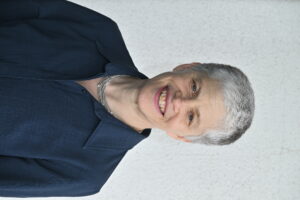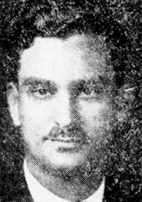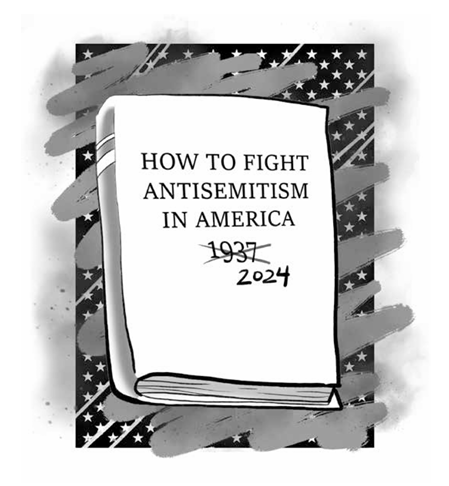The following is an excerpt from “Fragments III: Democracy, “ a journal from T’ruah.
This is part one of a debate across time between author Ben Lorber and Rabbi Joshua Trachtenberg about American Jews’ strategies to resist antisemitism. Read part two here.
“Stop Fascism: Preserve Democracy” was written in 1937 by Joshua Trachtenberg, a Reform rabbi and Labor Zionist1 based in Pennsylvania. Though it addressed the antisemitism rife in the U.S. in the 1930s, the contemporary resonance of Trachtenberg’s message is striking. Describing fascist movements’ deliberate use of antisemitism to dismantle civil liberties and destroy democracy, he argued that the only way to effectively resist was by galvanizing a broad-based, militant American anti-fascist movement dedicated to protecting Jews, all vulnerable minorities, and democracy itself.
Yet in the decade that followed, a different kind of militant, autonomous approach for Jews emerged, born of necessity in response to the mass destruction of European Jewry. In 1948 the State of Israel was established, envisioned as a safe refuge for Jews from around the world as well as a democratic society for all its citizenry.
While some still uphold this vision, it has been marred by Israel’s maltreatment of Palestinians within its borders and in the West Bank and Gaza, and by the religious domination of the Chief Rabbinate in Israeli society — with the consequence, some argue today, of fueling antisemitism and making Jews as well as democracy less secure. As conflicting visions of Israel complicate the work of fighting rising antisemitism and authoritarianism, is it still possible to unite around the protection of all vulnerable groups — including Jews and many others — as well as equality, democracy, and American liberties? As Trachtenberg wrote, too much is at stake for us not to try.
Rabbi Shirley Idelson, PhD
. . .
Were this essay entitled “How to Eradicate Anti-Semitism in America,” it should have to open with the grim admission: It can’t be done! Not short of demolishing the America we live in and building a new one, at any rate. Even outside Marxist circles it is a commonplace that anti-Semitism, in its modern recension, is a disease indigenous to our economic system, which goads the underprivileged, in their ignorance of the operation of social forces, to exact payment of the eternal scapegoat, the Jew, for the iniquities of the system itself. This diagnosis, for all its simplicity, points directly to the etiology of the disease; the honest physician must prescribe a revolutionary revamping of our social system, and the elimination of those economic relationships which are responsible for social inequalities and injustice. Malaria can be permanently wiped out only by thoroughly draining the swamps where the Anopheles mosquito breeds, and radically changing the character of the terrain. …
This analogy must constantly inform our efforts to combat anti-Semitism. There is only one ultimate cure — to drain the swamps of our social life where the Anopheles of anti-Semitism breeds. Short of that we cannot hope to eradicate the disease; we can seek only to abate its virulence.
The fight against anti-Semitism is a significant engagement in the greater war against economic injustice. That group which is alive to this truth will rally spontaneously to our side. …If we examine more closely the phenomenon of anti-Semitism, analyze those elements which direct mass unrest so inerringly against the Jew, we may discover this broader approach to effective alliance. Why is the Jew singled out as the scapegoat? The answer is not in doubt: because the Jew, as a member of a minority group, is in no position to defend himself; because the Jew, heir to a culture and a history and a cohesion which stamp him in the popular mind as “different,” protrudes from the un-differentiated mass which abhors individuality; because a hoary tradition of Jewish wickedness and contumely makes it a simple matter to pile on him one more sin, in the end, all the sins for which mankind suffers. It is this complex which renders the Jew so vulnerable in times of social stress and disturbance. …
The status of the Jew is the touchstone of the quality of our democracy, of the value of our constitutional rights. Because he is a minority and therefore the legitimate prey of those forces that would destroy our democratic system, attack upon the Jew is the entering breach in the wall of American liberties. Those who cherish the hard-won victories of American democracy and would preserve them can and must be made conscious of the significance of the Jew as a social symptom. To protect themselves they must protect the Jew first; once he has come under the shadow of social ostracism, of civil disability, their own positions are already undermined and tottering. The proofs need not be adduced; they are only too well-known. We include here, of course, the Negro, the Mexican, the Japanese, all minorities whose weakness lays them open to attack. But the symptomatic value of the Jew is unique in that he has become the traditional first line of offense in the war upon human rights. Aping their European mentors, there have come into the open in this country a host of bodies whose purpose, ostensibly, is to denigrate the Jew. But even a cursory examination of their platforms, and of the course of their trans-oceanic models, reveals that the entire corpus of our social liberties is subject to their fire, that once the Jew has been disposed of no other American will be safe. We have a word for this — Fascism!
The fact that our position is bound up with the preservation of American rights and principles is our greatest source of strength. Most men, however well-intentioned, are apathetic to the plight of their fellows until it threatens to overwhelm them too. The most powerful incentive to dash out the fire in a neighbor’s house is the apprehension that it may before long consume one’s own home as well. This is the basis of our appeal to America. …
We cannot go it alone. That is the start of any program to combat anti Semitism. But in the consciously democratic, anti-Fascist forces of this country, small though they may be, we have an incalculable source of strength. …They represent the articulate leadership of the true America, publicists, clergy, educators, labor leaders, liberals in every profession and trade. They can rally behind them a great mass of individuals whose thinking they do and whose opinions they shape. Through them the defense of Jewish rights, as of American, can seep down to lower layers of American humanity.
But we cannot — as we do not — advance this cause on the basis of self interest alone. Only as we are sincerely zealous for the preservation of liberty for all the American people, can we convey the fervor of our own crusade to others. Yet the self-interest cannot be blinked (sic.). Here we have the common ground upon which specifically Jewish and broadly American interests coalesce, without argument or persuasion. Not by exhorting, by preaching, by pleading our own need, can we arouse these other Americans to the danger that is inherent in the Fascist mentality, but by constituting in our combined strength the conscious vanguard of our common cause. It is high time we freed ourselves of the aptly categorized “sha-sha” philosophy of Jewish polemics, which sought to turn away wrath with gentle words, to obscure the Jew from the public gaze. As though such a superficial tactic could in any wise affect fundamentals! It failed us in Germany; in England it proved a broken reed; it has failed us here too. “Anti-defamation” campaigns and pious statistics are less than no defense. We must be prepared, in conjunction with all the progressive forces that can be mobilized on this front, to utilize every available weapon against the Fascist and anti-Jewish menace: the legislatures, the law-courts, the boycott, a relentless propaganda. And all, not to protect Jewish rights, but to protect American rights. …
The Jew has yet to make an impress upon a preponderant section of the American public simply as human being. Here we approach the heart of our problem, for it is the “demonic” Jew, the Jew who somehow stands apart from human-kind, who is forced to bear the burden of the world’s woes. Who has not heard: “Oh, Goldberg is a white Jew; he is not like other Jews?” The futility of adducing statistics to demonstrate that Jews are not all Communists, are not all capitalists! …He is not, in basic human qualities, member of our human race — this is the unvoiced and unconscious foundation upon which are reared all the other, more “reasonable” accusations.
Does this sound too wild to credit? Here are a few of the lunacies that pass for truth in America — they come from the lips of farmers, a judge, a superintendent of public schools, reputable business men, railway conversationalists, a cross-section of the American people: that Jewish heads are crowned with horns, that Jews are possessed of a distinctive odor (one man said he could distinguish a Jew by his odor twenty feet away), that all Jews, without exception, walk with toes turned out, that all Jewish women are big-busted, that Jews still practice sacrifice (at the Chicago World’s Fair more than one person poked around in the Jewish exhibit hunting for the sacrificial instruments) and that occasionally the victim is a human being, that Jews are privy to the dark secrets of Black Magic! These are some of the “facts” current in this land. …[S]ignificant is the subconscious readiness to believe such things. This is not the place to discuss the historic background of this “demonic” picture of the Jew — but that it exists there can be no denying. It is this conception that makes it possible for the mass of Americans unthinkingly to subscribe to the legend of the “international Jew” preying upon the world, whether through Communism, or “international finance,” and to the rest of the hackneyed stock-in-trade of anti-Semitic incitement. The Jew is inhuman and anti-human; such a view lends zest and facility to the channelling of mass unrest against him.
What measures can possibly uproot such fantastic notions, re-educate a continent? We need not delude ourselves with wishful thinking; the lessons of millenia are not to be undone in a generation or a century. But in a small way at first it should be possible to develop a program which can make some impression upon the American public. And here again we must turn to our Christian friends, the defenders of American democracy, for the effective force behind such a program. …The only way America at large can be reached is through those who already have its trusting ear: ministers, teachers, publicists, etc., who exert the greatest direct educational influence. …
[I]t is in the church school that most children first make the acquaintance of the Jew. …“The Jews killed our Lord” is still the first and most persuasive plank in anti-Semitism. Even when concern with religion dies, and religious affiliations are broken, the subconscious retains that initial childish upsurge of loathing and hate for the less than human creatures who could so misuse the gentle founder of Christianity. …
In the broader field of education, too, we can develop a positive approach to the Jew as American and as human. Instruction in our schools is hardly responsive to the demands of American citizenship today, and to the crucial problem of group relationships. Nor does it recognize even in the smallest degree the role of the Jew in world and in American history. For most Americans the Jews ceased to exist when Jesus died — and yet, perversely, they still haunt the earth. …It is not a question of parading offensively vaunted Jewish achievements…but rather of establishing the Jew as American in the mind of America, of restoring the Jew to the realistic, earthy plane upon which other peoples have spent their existence.
What are the practical implications of such a program? Its breath taking scope, essential in every respect, is itself irrefutable proof of the futility of lone Jewish sniping. Short of a revolution2, which can destroy the merit of anti-Semitism as a social cathartic, the merest start can be made only through the medium of an embracing union of anti-Fascist forces. …Unorganized liberal sentiment is powerless. The prerequisite for any effective propaganda must be a true “united front” comprising all these groups on a broad basis of defense of American liberties. …
Can it be done? Can we organize the forces of democracy in this country to attack what is fundamentally an American, not a Jewish, problem? In more than one European country opinion has been regimented through organization and propaganda for ends diametrically opposed to ours. Can we apply the same vision and skill to a message of enlightenment and liberty? We cannot stop now to weigh odds; too much is at stake for us not to make the attempt… [G]ranted that Jews and Christians can work together for the larger end, the scourge of anti-Semitism is not beyond control. We can at least keep it within bounds, prevent it from assuming the epidemic proportions that have taken so bitter a toll of peace and freedom in other lands.
NOTES
1 This was a socialist stream of Zionism, identified with early kibbutzim, and one of the most significant in shaping the formation of the State of Israel. -L. Meirowitz Nelson
2 In the first half of the 20th century, many U.S. Jews were relieved to note how Soviet leaders set a global example by instituting formal policy against antisemitism. However, as became increasingly clear under Stalin’s rule, revolution against root problems like capitalism did not resolve antisemitism. The scapegoating of Jews continued to play an enduring systemic role in Soviet government and at grassroots levels. -A. Rosenblum

RABBI SHIRLEY IDELSON, PHD (she/her) directs the Zelikow School of Jewish Nonprofit Management (Zschool). Previously she served as Dean of HUC JIR’s New York campus and Director of the Hornstein Jewish Professional Leadership Program at Brandeis University. She is the author of “We Shall Build Anew: Stephen S. Wise, the Jewish Institute of Religion, and the Reinvention of American Liberal Judaism” (University of Alabama, 2022) and has edited and contributed to numerous books and publications.

RABBI JOSHUA TRACHTENBERG, PHD ((1904–1959) (he/him) was an American congregational rabbi, scholarly writer, and active communal leader. Ordained at Hebrew Union College in 1930, he served as a leader in regional and national Jewish organizations and conducted studies on Israel’s developing society. He was forthright in his public stances, taking positions in favor of exploring nuclear disarmament and against racism toward Mizrahi Jews in Israel. He was known for his scholarly approach to communal and religious matters and was widely mourned when he died at 56. His scholarship remains influential, including “Jewish Magic and Superstition” (1939) and “The Devil and the Jews: The Medieval Conception of the Jew and Its Relation to Modern Anti-Semitism” (1943).

